Overview
There is a growing international consensus on the need to reduce transport related GHG and make transport more sustainable in general. There is now also a growing consensus on what sustainable transport is. The debate now needs to shift towards the financing required to rapidly scale up the development and operation of sustainable, low carbon transport infrastructure and services.
Following the success experience in developing the SLoCaT Results Framework on Sustainable Transport the SLoCaT Partnership aims to facilitate the development of a Financing Framework for Sustainable, Low Carbon Transport. The Concept Paper on Financing Framework Sustainable, Low Carbon Transport indicates that as in the case of the Results Framework the development of such a Framework will build on and integrate existing and ongoing efforts rather than duplicating such efforts by new studies. The development of a Financing Framework will be a key step in aligning different sources of transport funding and thereby also making it possible to arrive at a significant scaling up of funding for sustainable transport.
Activities of SLoCaT Partnership on Financing of Sustainable, Low Carbon Transport
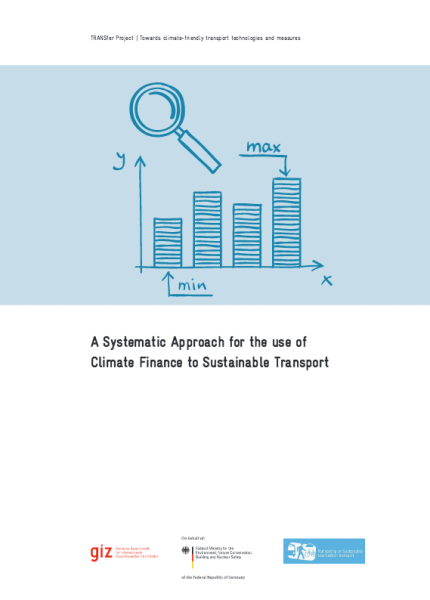 1- SLoCaT-GIZ TRANSfer Report: How to Systematically Use Climate Finance for Sustianbale Transport
1- SLoCaT-GIZ TRANSfer Report: How to Systematically Use Climate Finance for Sustianbale Transport
The SLoCaT Partnership working with the GIZ TRANSfer project has just launched a new report on how to systematically use Climate Finance for Sustainable Transport.
International Climate Finance (ICF), described simply as Official Development Assistance (ODA) directed to mitigation and adaptation, has not had the expected catalytic effect in transforming the transport sector to demonstrate low carbon impacts, increase climate resilience and support sustainable development yet it has the potential to take on this role.
ICF is much smaller than ODA and the dedicated multilateral climate funds, such as the Global Environment Facility, the Climate Investment Funds, the Nationally Appropriate Mitigation Actions (NAMA) Facility and the newly operational Green ClimateFund (GCF) are not yet able to provide the amount of financeneeded or the financial instruments that could assist such a transformation.
Consequently, the report identifies a four pronged strategic approach for using ICF for ST.
- Support climate-friendly transport policy development
- Build investment pipelines to improve the flow and quality of ST
- Unlock more private investment using ClimateFinance instruments
- Increase relevance of technical assistance and capacity building
Meeting the financing needs for scaling-up ST will rely on funding from national governments and expanding investments from the private sector. Policymakers can, and should, explicitly promote the development of ST measures, policies and programs. ICF should be used moresystematically to address the particular characteristics of the transport sector, the diversity of types of ST and leverage the potential for climate action and significant co-benefits from sustainable transport. More leadership by the Development Finance Institutions, including the MDBs, bi-lateral DFIs and other domestic DFI partners, is needed to accomplish the required shift in approach to the transport sector and the use of both ICF and ODA.
The full version of the report is available here.
2- Background paper on Mobilizing Private Sector Financing for Sustainable Transport in Asia for the 8th Regional Environmentally Sustainable Transport (EST) Forum in Asia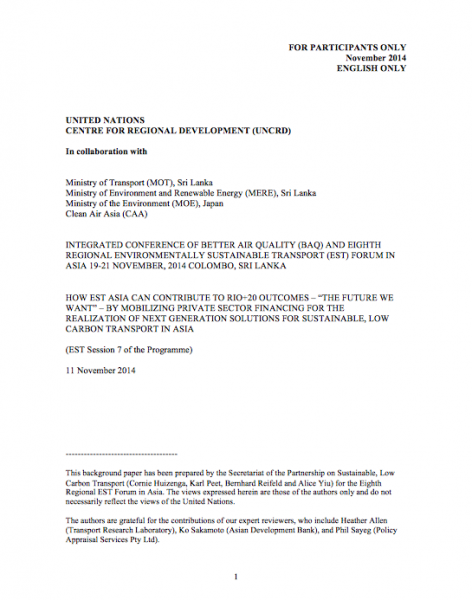
SLoCaT Partnership has prepared the background paper, “How EST Asia Can Contribute To Rio+20 Outcomes – ‘The Future We Want’ – by Mobilizing Private Sector Financing for the Realization of Next Generation Solutions for Sustainable, Low Carbon Transport In Asia” for the “Integrated Conference of Better Air Quality (BAQ) 2014 and Intergovernmental 8th Regional Environmentally Sustainable Transport (EST) Forum in Asia”. The EST Forum was held in Colombo, Sri Lanka on 19-21 November 2014.
This paper assesses the potential contribution of the private sector to scale up sustainable low carbon transport through three primary strategies: public-private partnerships, bond financing, and private sector operations of multilateral development banks. It focuses primarily on debt rather than equity financing (while acknowledging that much informal transport in Asia is equity financed), and on transport infrastructure rather than operations & maintenance (while acknowledging that the latter hold significant potential for private sector involvement).
The full text version of the background paper is available in here.
3- Roundtables on Financing & Funding of Sustainable, Low Carbon Transport
SLoCaT Partnership will be conducting a series of roundtable dialogues on private sector financing for sustainable transport. Through an iterative process with key stakeholders, these dialogues will help to underpin SLoCaT’s advocacy efforts on the finance dimension of a transport sector specific Means of Implementation for the currently discussed post-2015 UN Development Agenda, and will help contribute to the implementation of a new, more ambitious global climate change agreement under the UNFCCC by the end of 2015.
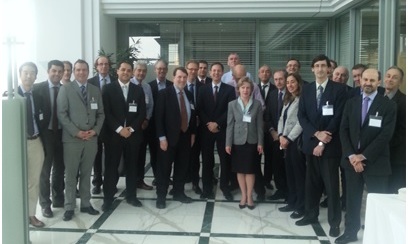 London Roundtable on Enhancing Private Sector Financing for Sustainable Transport: The kick-off meeting for the roundtable series was the “London Roundtable on Enhancing Private Sector Financing for Sustainable Transport”. The event organized by the Partnership on Sustainable, Low Carbon Transport (SLoCaT) and hosted by the European Bank of Reconstruction and Development (EBRD), took place on March 25th in London, United Kingdom. The workshop report can be downloaded here. For more details on the event please click here.
London Roundtable on Enhancing Private Sector Financing for Sustainable Transport: The kick-off meeting for the roundtable series was the “London Roundtable on Enhancing Private Sector Financing for Sustainable Transport”. The event organized by the Partnership on Sustainable, Low Carbon Transport (SLoCaT) and hosted by the European Bank of Reconstruction and Development (EBRD), took place on March 25th in London, United Kingdom. The workshop report can be downloaded here. For more details on the event please click here.
- Hong Kong Roundtable on Private Sector Financing for Sustainable Transport: The Partnership on Sustainable, Low Carbon Transport (SLoCaT Partnership) and the Konrad-Adenauer-Stiftung (KAS) jointly organized the “Hong Kong Roundtable on Private Sector Financing for Sustainable Transport” on 4th-5th of June, 2015. The aim of the roundtable is to advance the dialogue on private sector financing in sustainable urban transport beyond the current status quo to meet climate change targets and sustainable development goals. The workshop report can be downloaded here. For more details on the event, please click here.
The SLoCaT Partnership has released a background paper titled,”Alternative Financing Sources for Sustainable Transport: Public-Private Partnerships and Institutional Investors”, for the Hong Kong Round Table. The paper concludes that optimizing the potential contribution of institutional investors and PPPs to sustainable transport development will involve expanding and accelerating potential investment drivers and overcoming current obstacles to investment. The role of PPPs and institutional investors in driving sustainable transport investment is still quite early in its development curve; thus, on the one hand the sustainable transport community is faced with limited examples and a lack of clear trends, while on the other hand the community is presented with an opportunity to maximizing potential advantages in these emerging investment areas. For more details, please go to here.
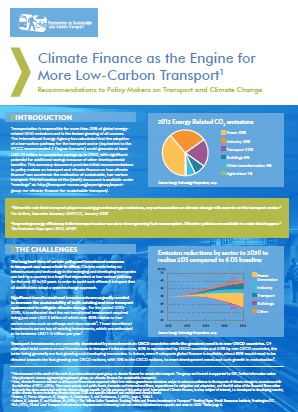
4- Promoting Climate Finance for Sustainable, Low Carbon Transport
The SLoCaT Partnership is facilitating an expert group for GIZ’s TRANSfer Project on promoting climate finance for sustainable transport. The expert group is composed of international experts on climate financing, financing of transport and sustainable, low carbon transport.
The expert group contributed to the development of a Draft Policy Brief “Scaling-up Sustainable, Low Carbon Transport – overcoming funding and financing challenges, and the role of climate finance”. An Executive Summary of the policy brief was published in December 2014. The Executive Summary titled, Climate Finance as the Engine for More Low-Carbon Transport, provides initial recommendations to policy makers on transport and climate finance on how climate finance can accelerate the realization of sustainable, low carbon transport.
5- SLoCaT Climate Finance Transport Database
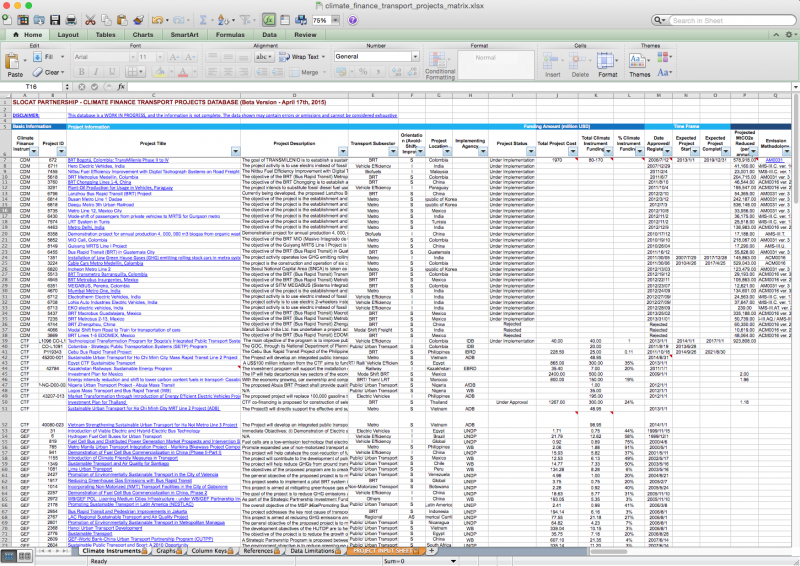 The SLoCaT Partnership has been collecting data on transport-focused projects from six of the main climate finance instruments (CFIs) to assess the contribution of these CFIs towards sustainable, low carbon transport. CFIs included in the assessment are: the Clean Development Mechanism (CDM), the Clean Technology Fund (CTF), the Global Environment Facility (GEF); the Nationally Appropriate Mitigation Actions (NAMA); The International Climate Initiative (IKI); the Joint Crediting Mechanism (JCM) and the Nordic Development Fund (NDF).
The SLoCaT Partnership has been collecting data on transport-focused projects from six of the main climate finance instruments (CFIs) to assess the contribution of these CFIs towards sustainable, low carbon transport. CFIs included in the assessment are: the Clean Development Mechanism (CDM), the Clean Technology Fund (CTF), the Global Environment Facility (GEF); the Nationally Appropriate Mitigation Actions (NAMA); The International Climate Initiative (IKI); the Joint Crediting Mechanism (JCM) and the Nordic Development Fund (NDF).
The Climate Finance Transport Matrix is now open for comments and input. You can download the matrix in here and contact Alice Yiu (alice.yiu@slocatpartnership.org) for any revision and input. For a more detailed narrative of the climate finance data, please go to here.
6- Comments on the Financing for Development Conference
SLoCaT Partnership carried out an Interim Assessment on how transport is reflected in the Zero Draft of the Addis Ababa Accord for the Third International Conference on Financing for Development. The third International Conference on Financing for Development will be held in Addis Ababa, Ethiopia, from 13 to 16 July 2015. The Conference will result in an intergovernmentally negotiated and agreed outcome, which should constitute an important contribution to and support the implementation of the post-2015 development agenda.
For more information, please visit here.